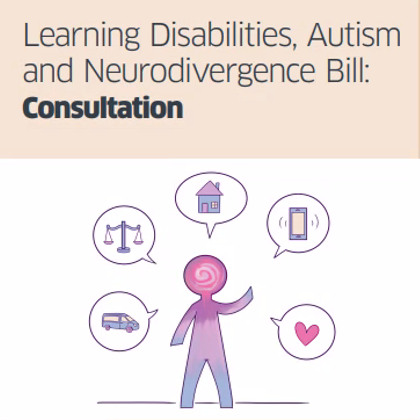The 3 panels of people with lived experience, specialist organisations and professionals working with Scottish Government to develop the LDAN Bill met last week to consider Mandatory Training for public sector professionals, in response the priorities identified in last year's Public Consultation on the Bill.
LDAN Bill - Mandatory Training for Public Bodies
Work has been moving forward on the key priority areas identified through the public consultation on the Scottish Government’s LDAN (Learning Disabilities, Autism and Neurodiversity) Bill.
ThIs work is being led by the LDAN team in Scottish Government, along with three panels - the Lived Experience Advisory Panel (people who are autistic, neurodivergent or/and have a learning disability), the Stakeholders Panel (specialist organisations, including SWAN), and the Practitioner Panel (specialist practitioners and professionals).
Last week, the 3 panels came together to discuss Mandatory Training for those working in public services.
Mandatory Training was one of the key themes in the LDAN Bill Consultation which people felt would lead to better awareness and understanding of the needs and experiences of neurodivergent people and people with learning disabilities, and improve the suitability and availability of services and support we need.
Also identified in the consultation was the need to include those with lived experience in designing, delivering and evaluating any changes, strategies and guidance, inclusive communication, training, and/or data collection, analysis and reporting.

In Scotland, existing training is optional and varies by employer. The NHS and Scottish Social Services Council (SSSC) offer some online training modules, but these are not mandatory and do not cover all types of neurodivergence, and most staff only get training if they work in specialist roles. There is also a lack of training, within the public sector, which is co-produced with people with lived experience.
There is a lot to work out, in terms of who should get this training, what it should contain, how it will be delivered and, importantly, how it can be written into law via the LDAN Bill so there is a legal duty for public bodies (initially in health, social care, and justice) to provide LDAN training tailored to staff roles.
As part of the process, the meeting considered what is currently happening in other countries, learning from the strengths and gaps to develop best practice for Scotland.
While everyone at the meeting agreed that it’s important for the training to be designed and delivered ‘with the involvement of people with lived experience’, many of us believe this falls short of what is needed and that, for any training about our needs and experiences to be effective and of the highest quality, it should be designed and delivered by professionals with lived experience, as well as co-produced with a wide range of people with lived experience.
The discussion also focused on who should get the training, with agreement on a proposed two-tier approach with mandatory training for all staff and enhanced training for those in specific roles. Many at the meeting felt that while it was important for training to be rolled out for all public sector staff, education was the most important area to focus on to ensure the right knowledge and skills are in place to support and empower young people and change the narrative around neurodivergence and learning disabilities from early in life.
The panel meetings, which are being held throughout the year, are the next stage in the process following the public consultation, and the LDAN team at Scottish Government will take back the discussions from the range of people with lived experience, specialist organisations and professionals on the three panels, in addition to your input from the consultation, to inform next steps in planning the content of the Bill.
